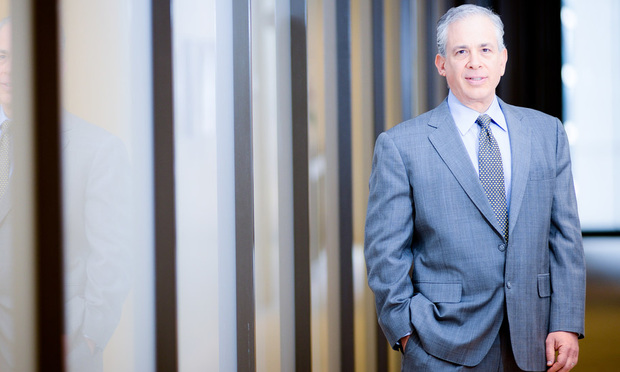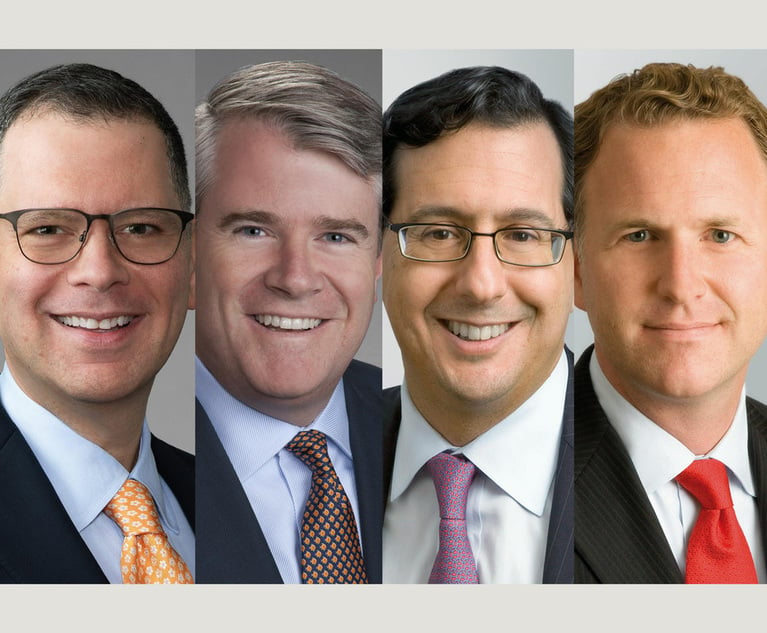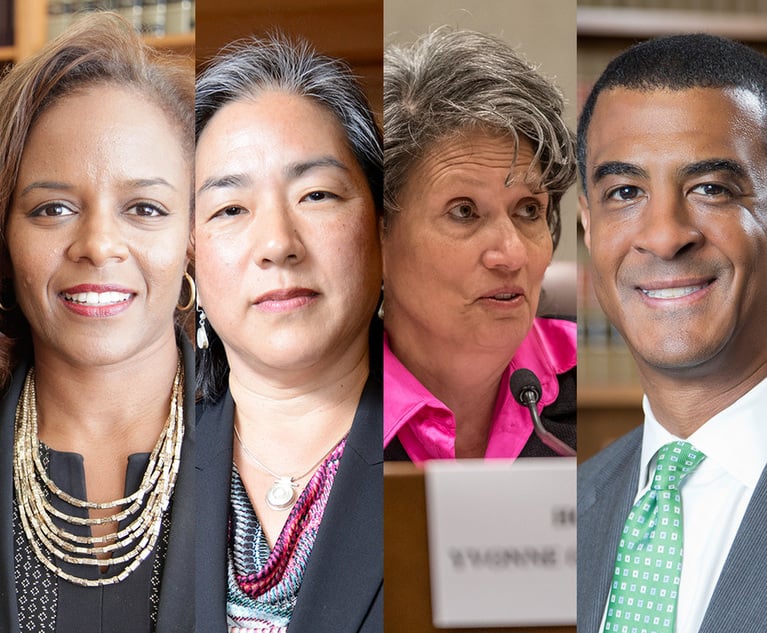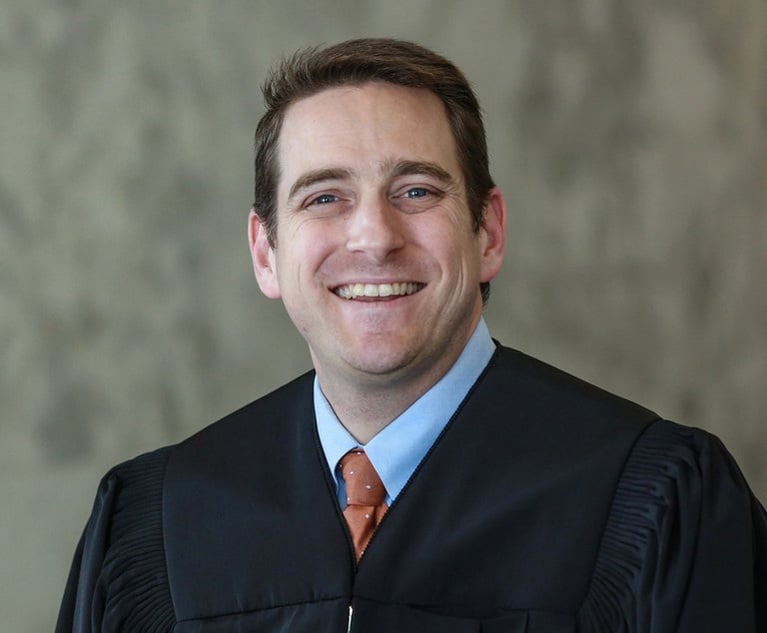For SCOTUS Advocates, Virus-Era Delays Pose 'Stay Fresh' Challenge
Preparation for U.S. Supreme Court arguments happens weeks in advance. The court's postponement of March arguments has fueled uncertainty in the virus era.
March 17, 2020 at 03:04 PM
8 minute read
The original version of this story was published on National Law Journal
 U.S. Supreme Court building April 23, 2019.
U.S. Supreme Court building April 23, 2019.
The U.S. Supreme Court's extraordinary postponement of its March argument session injected new uncertainty into a high-stakes process for a small group of advocates and their clients who said now they will work "to stay fresh" in hopes of getting their turn at the lectern.
The justices had scheduled 11 hours of oral argument during the March session in cases including the major copyright dispute between Google and Oracle, the secrecy of President Donald Trump's financial records, and job bias suits against religious employers. The court, citing the threat of the novel coronavirus, said it would reschedule arguments at a date yet to be announced.
The advocates who were in the final throes of argument preparation for those cases represented a mix of longtime high court veterans such as E. Joshua Rosenkranz, co-head of the Supreme Court and appellate practice at Orrick, Herrington & Sutcliffe, and Thomas Goldstein of Goldstein & Russell. They also included lawyers prepared to make their debuts, including Ramzi Kassem, a professor at the City University of New York School of Law, and the founder of its CLEAR clinic, which represents the respondents in Tanzin v. Tanvir in partnership with the Center for Constitutional Rights and Debevoise & Plimpton.
"I thought what it would be like if the court continued to have argument but closed it to the public," said Orrick partner Kelsi Corkran, who was to argue the excessive force case Torres v. Madrid on March 30. "That made me very nervous. I'm not sure how far the podium is from the justices. But when you're up there, it seems closer than it ought to be. Keeping the justices safe is very important."
Rosenkranz said the distance between the bench and the lectern is "close enough that I can't see one end of the bench in my peripheral vision when I'm looking at the other. Close enough that I wouldn't have shown up with a sore throat."
Advocates whose hearings were postponed voiced a strong desire to have those arguments at a later point. Although some court experts question the value of arguments, the advocates say they are a critical part of the process in which they not only get to make their strongest case, but the justices have their first opportunity to hear any concerns and work through their questions.
Chief Justice John Roberts Jr. is viewed by some as more flexible than his predecessor the late Chief Justice William Rehnquist, at least where the court schedule may be involved. He and his colleagues have a number of options available if the virus crisis intensifies and lingers. Besides rescheduling March arguments to the lighter April argument calendar or even a special May argument session, the court could move some of the cases to next term. It also could choose to decide some cases solely on the basis of the briefs filed.
In the meantime, the advocates are making plans to stay on top of their arguments. Goldstein and Rosenkranz were scheduled to argue what was likely the marquee case of the first March argument week—Google v. Oracle—March 24. It has been called the "copyright case of the century."
 Joshua Rosenkranz. Photo: David Handschuh/ALM
Joshua Rosenkranz. Photo: David Handschuh/ALM"Because I have multiple cases in the queue at any given time, I often begin my prep many weeks in advance," said Rosenkranz, who represents Oracle. "Here, the process started as soon as we submitted our brief. That way I can pick up and focus intensely in the three weeks before the argument. I crammed a lot into my head over the past couple of weeks."
He said Monday would have been the first of three moot courts lasting five hours each to test his preparation. "I'm happy to have gotten word before that moot court process started. It's grueling!" he said. "The argument will be just far enough away that my brain will have purged key details. So I will have to climb the mountain again. But that comes with the territory. In the overall scheme of things, I feel lucky to have that sort of problem."
Goldstein, who represents Google, had a backup plan ready and now implemented. "Each of the law firms involved was responsible for identifying people familiar with the case and letting us know when they were available as judges," he said. "We've assigned the next three moot courts so we can continue to stay fresh but also advance the ball."
Three other moot courts that he had hoped to do will be rescheduled as soon as the case has a new argument date. "It's just a question whether there will be intervening matters that distract," he said.
Goldstein acknowledged that a backup plan in the Google case was easier to accomplish because of the high stakes involved, but those resources might not be available to the lawyers handling pro bono or smaller stake cases.
Neither he nor Rosenkranz said they are concerned about the delay in the case, which has been in litigation for nearly a decade.
"We have had two trials, two trips to the Court of Appeals, and two trips to the SG's Office," said Rosenkranz. "A couple months (or more) will not make a material difference. We all know that the court will give serious consideration regardless of when it hears argument." Goldstein echoed his lack of concern, adding, "There is some uncertainty out there, but there's not a desperate need to get an immediate answer from the Supreme Court."
But the delay does have something of an impact on other clients. Stephen Vladeck of the University of Texas School of Law had the first argument slot of the session March 23. He represents three military members convicted of rape in a case involving the statute of limitations for their prosecutions.
"I've been in touch with one of my clients," he said. "I think the delay is frustrating insofar as it prolongs the uncertainty hanging over their appeals. But everyone understands that these are extraordinary times. These particular cases are direct appeals of criminal convictions where we won below, so my principal goal is whatever's in my clients' best interests. That may well include having the cases decided on the briefs this Term versus waiting for a potential argument next Term."
For now, he added, "Given the virus' impact on life at home [where he has two young children], I suspect I'll just put the case, and the argument prep, to the side until we have a new date."
Ramzi Kassem, who would have made his first high court argument in the Religious Freedom Restoration Act "no fly list" challenge March 24, said his clients "have already waited for years for their day in court" but are "patient" and understand postponement was the right decision for everyone.
"The unexpected and indefinite delay will create some inefficiencies down the line for counsel, with the need to ramp up again for argument," he said. "That process will be more or less effort-intensive depending on how much time passes between now and the date argument is rescheduled. Selfishly, as arguing counsel, I'd only add that the more advance notice ahead of rescheduled argument, the better."
For Orrick's Corkran, who represents Roxanne Torres in a Fourth Amendment excessive force case, the argument delay has had at least one positive impact even though it delays relief for her client.
"We've been working on our reply brief on a very expedited schedule," she said. "Now we have the full 30 days—a silver lining."
Read more:
DC Postpones Proceedings Until Mid-April, Trials Until May Over Coronavirus
US Supreme Court Postpones Upcoming Arguments Amid Coronavirus Threat
Paul Weiss' Brad Karp: We Need Obama, Bush and Clinton to Beat the Coronavirus
'All Hands on Deck' for Labor and Employment Firms Facing Flood of Employer Questions
As Coronavirus Threat Grows, More Courts Curb Access and Limit Oral Arguments
This content has been archived. It is available through our partners, LexisNexis® and Bloomberg Law.
To view this content, please continue to their sites.
Not a Lexis Subscriber?
Subscribe Now
Not a Bloomberg Law Subscriber?
Subscribe Now
NOT FOR REPRINT
© 2025 ALM Global, LLC, All Rights Reserved. Request academic re-use from www.copyright.com. All other uses, submit a request to [email protected]. For more information visit Asset & Logo Licensing.
You Might Like
View All
Litigators of the Week: US Soccer and MLS Fend Off Claims They Conspired to Scuttle Rival League’s Prospect

‘Listen, Listen, Listen’: Some Practice Tips From Judges in the Oakland Federal Courthouse
Law Firms Mentioned
Trending Stories
- 1States Accuse Trump of Thwarting Court's Funding Restoration Order
- 2Microsoft Becomes Latest Tech Company to Face Claims of Stealing Marketing Commissions From Influencers
- 3Coral Gables Attorney Busted for Stalking Lawyer
- 4Trump's DOJ Delays Releasing Jan. 6 FBI Agents List Under Consent Order
- 5Securities Report Says That 2024 Settlements Passed a Total of $5.2B
Who Got The Work
J. Brugh Lower of Gibbons has entered an appearance for industrial equipment supplier Devco Corporation in a pending trademark infringement lawsuit. The suit, accusing the defendant of selling knock-off Graco products, was filed Dec. 18 in New Jersey District Court by Rivkin Radler on behalf of Graco Inc. and Graco Minnesota. The case, assigned to U.S. District Judge Zahid N. Quraishi, is 3:24-cv-11294, Graco Inc. et al v. Devco Corporation.
Who Got The Work
Rebecca Maller-Stein and Kent A. Yalowitz of Arnold & Porter Kaye Scholer have entered their appearances for Hanaco Venture Capital and its executives, Lior Prosor and David Frankel, in a pending securities lawsuit. The action, filed on Dec. 24 in New York Southern District Court by Zell, Aron & Co. on behalf of Goldeneye Advisors, accuses the defendants of negligently and fraudulently managing the plaintiff's $1 million investment. The case, assigned to U.S. District Judge Vernon S. Broderick, is 1:24-cv-09918, Goldeneye Advisors, LLC v. Hanaco Venture Capital, Ltd. et al.
Who Got The Work
Attorneys from A&O Shearman has stepped in as defense counsel for Toronto-Dominion Bank and other defendants in a pending securities class action. The suit, filed Dec. 11 in New York Southern District Court by Bleichmar Fonti & Auld, accuses the defendants of concealing the bank's 'pervasive' deficiencies in regards to its compliance with the Bank Secrecy Act and the quality of its anti-money laundering controls. The case, assigned to U.S. District Judge Arun Subramanian, is 1:24-cv-09445, Gonzalez v. The Toronto-Dominion Bank et al.
Who Got The Work
Crown Castle International, a Pennsylvania company providing shared communications infrastructure, has turned to Luke D. Wolf of Gordon Rees Scully Mansukhani to fend off a pending breach-of-contract lawsuit. The court action, filed Nov. 25 in Michigan Eastern District Court by Hooper Hathaway PC on behalf of The Town Residences LLC, accuses Crown Castle of failing to transfer approximately $30,000 in utility payments from T-Mobile in breach of a roof-top lease and assignment agreement. The case, assigned to U.S. District Judge Susan K. Declercq, is 2:24-cv-13131, The Town Residences LLC v. T-Mobile US, Inc. et al.
Who Got The Work
Wilfred P. Coronato and Daniel M. Schwartz of McCarter & English have stepped in as defense counsel to Electrolux Home Products Inc. in a pending product liability lawsuit. The court action, filed Nov. 26 in New York Eastern District Court by Poulos Lopiccolo PC and Nagel Rice LLP on behalf of David Stern, alleges that the defendant's refrigerators’ drawers and shelving repeatedly break and fall apart within months after purchase. The case, assigned to U.S. District Judge Joan M. Azrack, is 2:24-cv-08204, Stern v. Electrolux Home Products, Inc.
Featured Firms
Law Offices of Gary Martin Hays & Associates, P.C.
(470) 294-1674
Law Offices of Mark E. Salomone
(857) 444-6468
Smith & Hassler
(713) 739-1250








